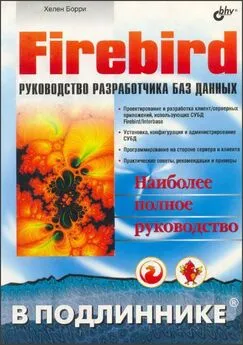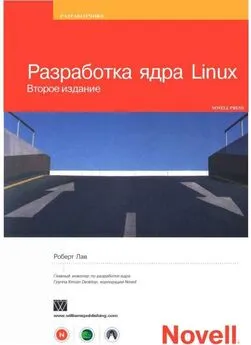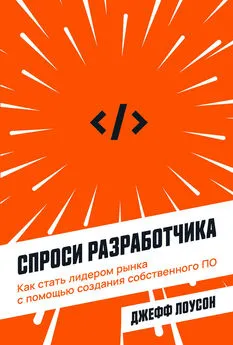Ори Померанц - Энциклопедия разработчика модулей ядра Linux
- Название:Энциклопедия разработчика модулей ядра Linux
- Автор:
- Жанр:
- Издательство:неизвестно
- Год:неизвестен
- ISBN:нет данных
- Рейтинг:
- Избранное:Добавить в избранное
-
Отзывы:
-
Ваша оценка:
Ори Померанц - Энциклопедия разработчика модулей ядра Linux краткое содержание
Linux Kernel Module Programming Guide свободная книга; Вы можете воспроизводить и/или изменять ее в соответствии с версией 2 (или, в вашем случае, любой более поздней версией) GNU General Public License, опубликованной Free Software Foundation. Версия 2 поставляется с этим документом в Приложении E.
Эта книга распространяется в надежде, что будет полезна, но без какой-либо гарантии; даже без подразумеваемой гарантии высокого спроса или пригодности какой-либо для специфической цели.
Автор поощряет широкое распространение этой книги для персонального или коммерческого использования, если вышеупомянутое примечание относительно авторского права остается неповрежденным, и распространитель твердо придерживается условий GNU General Public License (см. Приложение E). Вы можете копировать и распространять эту книгу бесплатно или для получения прибыли. Никакое явное разрешение не требуется от автора для воспроизводства этой книги в любой среде, физической или электронной.
Обратите внимание, производные работы и переводы этого документа должны быть помещены согласно GNU General Public License, и первоначальное примечание относительно авторского права должно остаться неповрежденным. Если Вы пожертвовали новый материал этой книге, Вы должны сделать исходный текст доступным для ваших изменений. Пожалуйста делайте изменения и модификации, доступные непосредственно поддерживающему данный проект Ori Pomerantz. Он объединит модификации и обеспечит непротиворечивость изменений для всего Linux сообщества.
Если Вы планируете издавать и распространять эту книгу коммерчески, пожертвования, лицензионные платежи, и/или напечатанные копии будут высоко оценены автором и Linux Documentation Project (LDP). Содействие таким образом показывает вашу поддержку свободного программного обеспечения и Linux Documentation Project. Если Вы имеете вопросы или комментарии, пожалуйста войдите в контакт с автором по адресу, приведенному выше.
Энциклопедия разработчика модулей ядра Linux - читать онлайн бесплатно полную версию (весь текст целиком)
Интервал:
Закладка:
if (*Message_Ptr == 0) return 0;
/* Actually put the data into the buffer */
while (length && *Message_Ptr) {
/* Because the buffer is in the user data segment,
* not the kernel data segment, assignment wouldn't
* work. Instead, we have to use put_user which
* copies data from the kernel data segment to the
* user data segment. */
put_user(*(Message_Ptr++), buffer++);
length--;
bytes_read++;
}
#ifdef DEBUG
printk("Read %d bytes, %d left\n", bytes_read, length);
#endif
/* Read functions are supposed to return the number
* of bytes actually inserted into the buffer */
return bytes_read;
}
/* This function is called when somebody tries to write into our device file. */
#if LINUX_VERSION_CODE >= KERNEL_VERSION(2,2,0)
static ssize_t device_write(struct file *file, const char *buffer, size_t length, loff_t *offset)
#else
static int device_write(struct inode *inode, struct file *file, const char *buffer, int length)
#endif
{
int i;
#ifdef DEBUG
printk("device_write(%p,%s,%d)", file, buffer, length);
#endif
for(i=0; i
#if LINUX_VERSION_CODE >= KERNEL_VERSION(2,2,0)
get_user(Message[i], buffer+i);
#else
Message[i] = get_user(buffer+i);
#endif
Message_Ptr = Message;
/* Again, return the number of input characters used */
return i;
}
/* This function is called whenever a process tries to
* do an ioctl on our device file. We get two extra
* parameters (additional to the inode and file
* structures, which all device functions get): the number
* of the ioctl called and the parameter given to the ioctl function.
*
* If the ioctl is write or read/write (meaning output
* is returned to the calling process), the ioctl call
* returns the output of this function. */
int device_ioctl(struct inode *inode, struct file *file,
unsigned int ioctl_num, /* The number of the ioctl */
unsigned long ioctl_param) /* The parameter to it */
{
int i;
char *temp;
#if LINUX_VERSION_CODE >= KERNEL_VERSION(2,2,0)
char ch;
#endif
/* Switch according to the ioctl called */
switch (ioctl_num) {
case IOCTL_SET_MSG:
/* Receive a pointer to a message (in user space)
* and set that to be the device's message. */
/* Get the parameter given to ioctl by the process */
temp = (char*)ioctl_param;
/* Find the length of the message */
#if LINUX_VERSION_CODE >= KERNEL_VERSION(2,2,0)
get_user(ch, temp);
for (i=0; ch && i
#else
for (i=0; get_user(temp) && i
#endif
/* Don't reinvent the wheel - call device_write */
#if LINUX_VERSION_CODE >= KERNEL_VERSION(2,2,0)
device_write(file, (char*)ioctl_param, i, 0);
#else
device_write(inode, file, (char*)ioctl_param, i);
#endif
break;
case IOCTL_GET_MSG:
/* Give the current message to the calling
* process - the parameter we got is a pointer, fill it. */
#if LINUX_VERSION_CODE >= KERNEL_VERSION(2,2,0)
i = device_read(file, (char*)ioctl_param, 99, 0);
#else
i = device_read(inode, file, (char*)ioctl_param, 99);
#endif
/* Warning - we assume here the buffer length is
* 100. If it's less than that we might overflow
* the buffer, causing the process to core dump.
*
* The reason we only allow up to 99 characters is
* that the NULL which terminates the string also needs room. */
/* Put a zero at the end of the buffer, so it will be properly terminated */
put_user('\0', (char*)ioctl_param+i);
break;
case IOCTL_GET_NTH_BYTE:
/* This ioctl is both input (ioctl_param) and
* output (the return value of this function) */
return Message[ioctl_param];
break;
}
return SUCCESS;
}
/* Module Declarations *************************** */
/* This structure will hold the functions to be called
* when a process does something to the device we
* created. Since a pointer to this structure is kept in
* the devices table, it can't be local to
* init_module. NULL is for unimplemented functions. */
struct file_operations Fops = {
NULL, /* seek */
device_read,
device_write,
NULL, /* readdir */
NULL, /* select */
device_ioctl, /* ioctl */
NULL, /* mmap */
device_open,
#if LINUX_VERSION_CODE >= KERNEL_VERSION(2,2,0)
NULL, /* flush */
#endif
device_release /* a.k.a. close */
};
/* Initialize the module - Register the character device */
int init_module() {
int ret_val;
/* Register the character device (atleast try) */
ret_val = module_register_chrdev(MAJOR_NUM, DEVICE_NAME, &Fops);
/* Negative values signify an error */
if (ret_val < 0) {
printk("%s failed with %d\n", "Sorry, registering the character device ", ret_val);
return ret_val;
}
printk("%s The major device number is %d.\n", "Registeration is a success", MAJOR_NUM);
printk("If you want to talk to the device driver,\n");
printk ("you'll have to create a device file. \n");
printk ("We suggest you use:\n");
printk ("mknod %s c %d 0\n", DEVICE_FILE_NAME, MAJOR_NUM);
printk ("The device file name is important, because\n");
printk ("the ioctl program assumes that's the\n");
printk ("file you'll use.\n");
return 0;
}
/* Cleanup - unregister the appropriate file from /proc */
void cleanup_module() {
int ret;
/* Unregister the device */
ret = module_unregister_chrdev(MAJOR_NUM, DEVICE_NAME);
/* If there's an error, report it */
if (ret < 0) printk("Error in module_unregister_chrdev: %d\n", ret);
}
/* chardev.h - the header file with the ioctl definitions.
*
* The declarations here have to be in a header file,
* because they need to be known both to the kernel
* module (in chardev.c) and the process calling ioctl (ioctl.c)
*/
#ifndef CHARDEV_H
#define CHARDEV_H #
include
/* The major device number. We can't rely on dynamic
* registration any more, because ioctls need to know it. */
#define MAJOR_NUM 100
/* Set the message of the device driver */
#define IOCTL_SET_MSG _IOR(MAJOR_NUM, 0, char *)
/* _IOR means that we're creating an ioctl command
* number for passing information from a user process
* to the kernel module.
*
* The first arguments, MAJOR_NUM, is the major device
* number we're using.
*
* The second argument is the number of the command
* (there could be several with different meanings).
*
* The third argument is the type we want to get from
* the process to the kernel. */
/* Get the message of the device driver */
#define IOCTL_GET_MSG _IOR(MAJOR_NUM, 1, char *)
/* This IOCTL is used for output, to get the message
* of the device driver. However, we still need the
* buffer to place the message in to be input,
* as it is allocated by the process. */
/* Get the n'th byte of the message */
#define IOCTL_GET_NTH_BYTE _IOWR(MAJOR_NUM, 2, int)
/* The IOCTL is used for both input and output. It
* receives from the user a number, n, and returns Message[n]. */
/* The name of the device file */
#define DEVICE_FILE_NAME "char_dev"
#endif
/* ioctl.c - the process to use ioctl's to control the
* kernel module
*
* Until now we could have used cat for input and
* output. But now we need to do ioctl's, which require
* writing our own process. */
/* Copyright (C) 1998 by Ori Pomerantz */
/* device specifics, such as ioctl numbers and the major device file. */
#include "chardev.h"
#include /* open */
#include /* exit */
#include /* ioctl */
/* Functions for the ioctl calls */
ioctl_set_msg(int file_desc, char *message) {
int ret_val;
ret_val = ioctl(file_desc, IOCTL_SET_MSG, message);
if (ret_val < 0) {
printf("ioctl_set_msg failed:%d\n", ret_val);
exit(-1);
}
}
ioctl_get_msg(int file_desc) {
int ret_val;
char message[100];
/* Warning - this is dangerous because we don't tell
* the kernel how far it's allowed to write, so it
* might overflow the buffer. In a real production
* program, we would have used two ioctls - one to tell
* the kernel the buffer length and another to give
* it the buffer to fill */
ret_val = ioctl(file_desc, IOCTL_GET_MSG, message);
if (ret_val < 0) {
printf("ioctl_get_msg failed:%d\n", ret_val);
Интервал:
Закладка:





